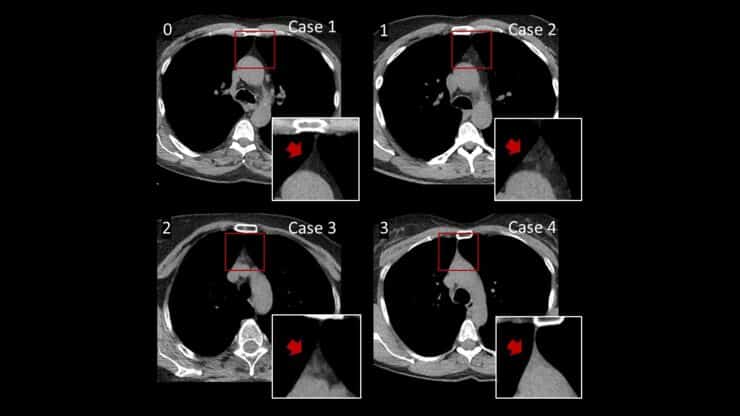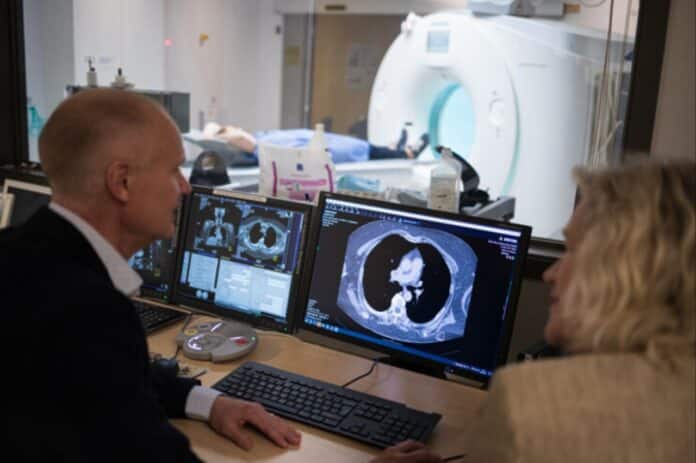A new study from LiU suggests that the thymus, a relatively small and less-understood organ, may have a more significant role in the adult immune system than previously thought. As people age, the thymus’s glandular tissue is replaced by fat, and factors like gender, age, and lifestyle influence this process. These findings suggest that changes in the thymus may mirror the aging of the immune system.
Mårten Sandstedt, MD, PhD, at the Department of Radiology in Linköping University and Department of Health, Medicine and Caring Sciences, Faculty of Medicine and Health Sciences, Linköping University, said, “We doctors can assess the appearance of the thymus from largely all chest CT scans, but we tend to not see this as very important. But now it turns out that the appearance of the thymus can provide much valuable information that we could benefit from and learn more about.”
The thymus, a small gland in the chest, is well-known for its role in developing the immune system in children. However, it shrinks and turns into fat after puberty, leading to the belief that it loses its function in adulthood. But recent, albeit limited, studies, mainly on animals, have suggested that an active thymus in adults might be beneficial, offering better protection against infections and cancer. Only a handful of studies have looked into the adult thymus so far.
In a recent study published in Immunity & Ageing, researchers examined more than 1,000 individuals aged 50 to 64 from the SCAPIS study. This more extensive study looks into heart and lung health. It includes detailed imaging and health assessments, like dietary habits and physical activity. In their part of the study, the researchers also looked at immune cells in the blood.
They found that thymus appearance varied greatly. About six in ten participants had complete fatty degeneration of the thymus, which was more common in men and those with abdominal obesity. Lifestyle factors played a role, too, with a low fiber intake associated with thymus fatty degeneration, as noted by Mårten Sandstedt.
The Linköping researchers have linked thymus appearance to lifestyle, health, and the immune system. The thymus plays a crucial role in educating T-cells, a type of immune cell, about recognizing and dealing with foreign invaders while not attacking the body’s cells to prevent autoimmune diseases. Their study found that people with fatty thymus degeneration had slower T-cell regeneration.
Lena Jonasson, professor at the Department of Cardiology in Linköping and Department of Health, Medicine and Caring Sciences, Faculty of Medicine and Health Sciences, Linköping University, said, “This association with T-cell regeneration is interesting. It indicates that what we see in CT scans is not only an image but also reflects the functionality of the thymus. You can’t do anything about your age and sex, but lifestyle-related factors can be influenced. It might be possible to influence immune system aging.”

More extensive research is required to determine if thymus appearance and its connection to immune system aging impact our health. The researchers plan to conduct follow-up studies on the thymus images from all 5,000 participants in SCAPIS Linköping to investigate if CT scans of the thymus can predict future disease risk.
This study was funded by several organizations, including the Heart-Lung Foundation, the Swedish Research Council, and Region Östergötland, and Mårten Sandstedt has affiliations with the Center for Medical Image Science and Visualization, CMIV, in Linköping.
In conclusion, this study underscores the promising role of CT scans in shedding light on immune system aging and its connection to thymus appearance. It offers intriguing associations with gender, obesity, and dietary habits. However, to fully grasp this method’s broader health implications and predictive value, further research and extensive investigations will be essential.
Journal reference:
- Sandstedt, M., Chung, R., Skoglund, C. et al. Complete fatty degeneration of thymus associates with male sex, obesity and loss of circulating naïve CD8+ T cells in a Swedish middle-aged population. Immunity & Ageing. DOI: 10.1186/s12979-023-00371-7.
